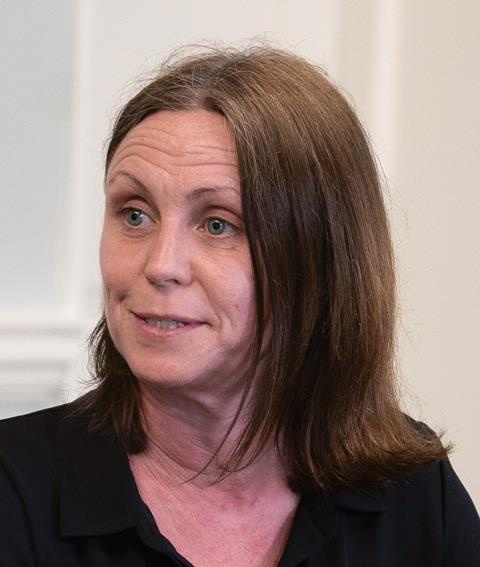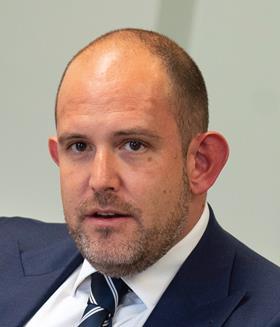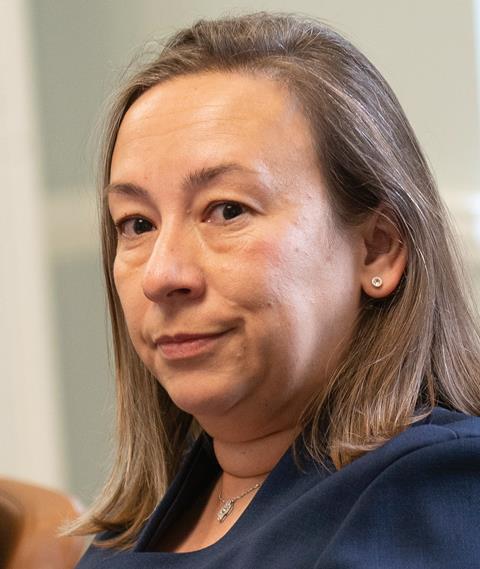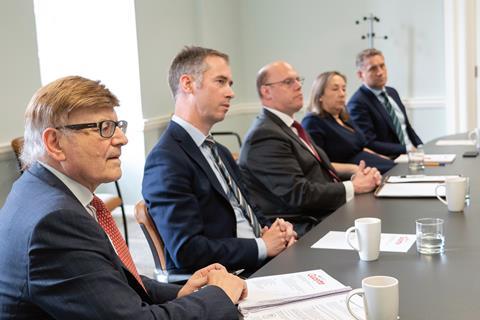From coping with the explosion of data to the challenge of keeping disputes in the UK post-Brexit, commercial litigators have a full in-tray. Eduardo Reyes reports from the latest Gazette roundtable discussion
At the table
(From top left, clockwise)
Stephen Rosen Collyer Bristow
Luke Harrison Keidan Harrison
Tom Ellis Osborne Clarke
David Greene Edwin Coe
Ed Crosse Simmons & Simmons
Maurice MacSweeney Harbour Litigation Funding
Eduardo Reyes Law Society Gazette
Kate Allass Farrer & Co
Jason Woodland Peters & Peters
Sinead O’Callaghan Cooke Young & Keida
David Wright Seddons Solicitors
English law enjoys a pre-eminence in commercial contracts worldwide, a position that feeds disputes to London for litigation and, drawn by the concentration of high-quality litigators, arbitration too. Brexit, however, has complicated the UK’s position as a jurisdiction of choice. Given English law’s status as part of the country’s ‘soft power’ in the world, how do those present view its position – is it secure, or under threat?

David Greene, senior partner of Edwin Coe and a former Law Society president, begins with a look at the competition other European jurisdictions present in the area of collective or group actions. ‘There are two jurisdictions battling out for dominance in relation to collective action, particularly competition claims. The Dutch and us,’ he says.
‘Brexit has had the effect that the Netherlands might now seem to be dominant in the European field because… the decisions we make no longer have the effect that they used to have within Europe. But the Dutch decisions do have an effect in Europe and therefore, as far as collective actions are concerned, Brexit has affected our prior dominance.’
Elsewhere the picture is more mixed, he adds: ‘I don’t think the English-language courts in Paris or the Netherlands are going to be a huge competition to us.’
Global drift
Sinead O’Callaghan, managing partner at Cooke Young & Keidan, shares the conclusions of research the firm carried out with foreign lawyers and in-house lawyers during the pandemic. ‘A resounding majority said they would be advising their clients, their in-house clients, to switch to arbitration clauses,’ she says, leading her to conclude: ‘There probably will be an effect further down the line. The disputes we’ll be seeing in a couple of years’ time may well be arbitrated rather than litigated through the courts here.’
Peters & Peters partner Jason Woodland says: ‘The effect of Brexit is much less compared to the challenge from arbitration in particular, but also courts like Singapore which have been very, very proactive about technology, about the user experience. I think that is a real challenge for us, rather than the commercial courts in France or Germany.’

For Indian parties, several present confirm, disputes that would formerly have come to London have headed to Singapore. ‘I think cost has been one of the main drivers of discouraging people from engaging in litigation over here,’ says Osborne Clarke partner Tom Ellis. But it is far from game over for London, as cost is only one element that parties consider. Ellis adds: ‘One of the plus points of London is not only do we have an extremely capable set of lawyers who can handle complex litigation, we now have an emerging group of legal tech companies which are making litigation over here much more cost‑effective.’
Maurice MacSweeney, director of litigation funding at Harbour, says the ability of the judiciary to assimilate new technology and developing asset classes in litigation is a definite plus for England and Wales. He notes the appeal of ‘the way the judges have approached blockchains, smart contracts [and] cryptocurrencies… combined with a longstanding ability to seek worldwide freezing orders in the UK courts and the wide jurisdiction the judges have to make many different orders for interim relief.
‘That, combined with a general focus by the government on wanting to make the UK a centre for technical innovation, particular in the financial sector’ means such cases can be ‘a real area of growth’ for UK disputes.
The cost of litigation may often be cited as a deterrent, but it is only part of the ‘experience’ of litigating in the UK, Ellis stresses. US clients, he notes, ‘report back that the experience of litigating over here is far easier, far more efficient, and invests a sense of optimism and real confidence as to outcome, relative to a number of their more local courts’.
‘Litigants are looking for a stable jurisdiction in an environment where there’s lots of instability around the world and sometimes in unexpected places,’ Farrer & Co partner Kate Allass adds. ‘We’re probably seen as the last bastion of very stable law.’
London’s Commercial Court remains busy. But Simmons & Simmons partner Ed Crosse points out that the disputes presently being litigated in the capital have their origins in decisions on forum made several years ago. ‘The thing that worries me is the uncertainty of the future and how commercial clients may react to that in terms of the dispute resolution clauses that they include in their agreements,’ he says. ‘You may, in the longer term, start to see that, actually, the reason why business is going away is because they’ve elected to go to other jurisdictions. We are definitely seeing alternatives… other jurisdictions that they can use.’
Technology and hybridity
'Judges actually had better setups working from home than they often did in the courtroom, [as did] the lawyers'
Luke Harrison, Keidan Harrison

The courts’ use of technology to allow remote and hybrid hearings could be a point in favour of arguments for disputes to continue heading to London.
‘What was admirable, since the pandemic started,’ Ellis says, ‘was how quickly the courts did embrace hybrid working. When you speak to lawyers in other jurisdictions, it’s not the case at all – and it’s still not the case. So I think it’s quite remarkable how quickly [we] did embrace it.’
‘The courts really do need to be permanently equipped for hybrid hearings,’ adds Luke Harrison, partner and solicitor advocate at Keidan Harrison. That requires investment in the infrastructure of the Business and Property Courts, he says, pointing out that ‘judges actually had better setups working from home than they often did in the courtroom, [as did] the lawyers’.
Common law advantage
‘We have to work harder to make London the place of choice,’ Greene says. ‘I think one thing that we might talk about is the expense of London. It’s not a cheap venue, but then the common law’s not cheap, because it’s adversarial.’
Concerns about the cost of disclosure in commercial litigation have led to a pilot scheme in the BPC that seems set to be more widely adopted (see box).
The adversarial system can also be viewed by parties as an advantage, Crosse interjects. ‘One of the big attractions is the fact that you can really interrogate all the facts in the case, by getting full disclosure, by having witnesses cross-examined,’ he says. ‘We do complain about the cost, but when you litigate in some other jurisdictions and [clients are] told… the other side don’t have to produce adverse documents, those clients are frustrated.’ The adversarial system gets to ‘the truth’, Crosse points out, ‘but it comes at a price’.
The attraction of litigating fraud cases in London is clear, Collyer Bristow partner Stephen Rosen notes. ‘Fraudsters rarely agree arbitration clauses with the victims of their fraud, so as long as you can get jurisdiction over here, London I think is still favoured,’ he says. ‘In particular, that is because of the very wide range of information-gathering powers that you have to uncover the fraud non-responder, [and] also the interim relief.’
Freezing orders are commonly referenced here, ‘but also the wide range of additional menu options that you can tag on to tackle fraud, and to tackle international fraud from London’, Rosen adds.
Revealing Insights: Disclosure Pilot
Is it possible to reduce the burden of disclosure in commercial litigation through procedural reforms without prejudicing the fair outcome of a case? That is the question that a pilot scheme in the Business and Property Courts, guided by the Disclosure Working Group (DWG), sought to answer.
At the heart of the pilot is a simplified approach that pushes the parties to early agreement on the scope of disclosure requests and search terms, and a reduction in paper-based and manual checks demanded by part 31 of the Civil Procedure Rules (disclosure and inspection of documents). The pilot is due to end next year – so will the pilot be embedded across the system?

Simmons & Simmons partner Ed Crosse (pictured), a member of the DWG, thinks it will. ‘The pilot itself has been extended a couple of times,’ Crosse says. ‘If you listen to what the master of the rolls is saying, it’s unlikely it’s just going to be abandoned and we’ll go back to paper-based rule, which part 31 was. So, the focus now is on looking further at how it’s operating, identifying whether it can be changed further in response to the feedback we’ve received, from the judiciary, chancery and commercial bar associations and also from professional bodies like the Association of Litigation Professional Support Lawyers.’
Further work, he says, needs to be done around ‘areas of challenge like overcomplexity of drafting a list of issues’, the ‘misuse’ of model C disclosure requests, and ‘trying to beef up the practice direction to make it even clearer that the simplified approach is what is necessary’.
More can be done to address the cost of lower-value claims, Crosse adds: ‘In the last round of reforms in September last year we introduced a regime called the Less Complex Claims Regime, which was intended to be [Disclosure Review Document]-light, limited [to] five issues for disclosure… making it much, much simpler. No Model C. That was in response to feedback that we got particularly from the centres outside London and it has been pretty well-received.’
He says: ‘I think there’s actually a lot of appetite for that to be extended in terms of the guidance on the monetary limits, so I’m certainly pushing for it to go up to £1m. Maybe it should be higher. It may well be that the Less Complex Claims Regime is perfectly suitable for a higher value claim as well.’
Costs advantages
One option for clients who want to manage the cost and commercial risks of cases is to seek litigation funding, which has grown dramatically in recent years.
Allass says: ‘The more sophisticated clients are already aware of litigation funding: it’s one of the first questions they ask. We have early conversations with them about that, and actually there is now a panoply of options that we can put to them, and so having that skill-set is really important.’

Litigation funders, like Harbour, the sponsor of this roundtable, want to back cases that are run by firms that show they are organised around organising and predicting costs. Here the increasing demands of costs budgeting are important, though firms have a chequered record in meeting these aims.
‘My experience,’ Ellis says, ‘is most lawyers are more effective in terms of explaining… what it means to engage in a heavy bit of litigation and what that will cost. I think that is a helpful thing that’s evolved over the last five years.’
Harrison says costs budgeting can be viewed as a positive requirement: ‘I think cost budgeting has actually improved lawyer relationships with clients, in the sense that it actually forces a bit more rigour into the cost estimation process.’
‘It’s really encouraging to hear about the increasing use of data in order to better present estimated costs,’ Harbour’s MacSweeney says. ‘Our experience is that often law firms don’t make enough use of their internal data for producing accurate costs budgets. We’re well aware that things change in litigation, unexpected things arise, and so we’re pretty diligent at the very outset asking the firm to… imagine [that] everything that could possibly go wrong will go wrong, and [considering] what’s going to be the cost of mitigating that? Yet still we often receive requests for budget increases, which can reduce the economic viability of a case.’
'The more sophisticated clients are already aware of litigation funding: it’s one of the first questions they ask… there is now a panoply of options that we can put to them, and so having that skill-set is really important'
Kate Allass, Farrer & Co
Where do the merits of a case stand in a funder’s assessment?
‘Merits are really important, but they come towards the bottom of the list of importance’ MacSweeney answers. ‘Enforcement is the most important thing for an investor in a case. You can have a really fantastic case, with great legal merits, but unless you can actually enforce that judgment or that award, then in a sense what’s the point in doing it?’
Also ahead of merits, he adds, is knowing ‘that the legal team that’s running the case has experience of bringing those sorts of cases to a successful conclusion’. And, of course, all eyes are on the ‘economics’ of a case, which can change depending on whether a jurisdiction is ‘high cost’.
‘If we’re trying to get funded,’ Greene says, ‘we’re trying to put together an investment proposal for funders.’ Of central importance in that process is a close focus on ‘quantification’, he adds.

Call of the courtroom
The competition for good newly qualified and junior lawyers among commercial law firms remains fierce, which is reflected in many City firms’ salaries for this cohort. What does this group think will continue to attract and keep good recruits for commercial litigation?
‘Litigators… I think you can sniff them out,’ Greene replies, adding that litigation has a unique appeal. ‘Building a practice is quite difficult because it’s not a specialisation. We are general practitioners really. Any dispute that comes through the door, in certain circumstances, we’ll deal with it. So, I often say it’s the last bastion of a general practitioner – commercial litigation.’
Allass says the increased prominence of data in disputes is a concern for some candidates.
‘There was a trend of people coming in to interview saying, “I’m applying because I want access to the law, decision-making and analysis, and not just to be involved in data processing”,’ she says. ‘Some firms had expressly couched the role as one of a future data processor. Which is not what they go through university to become. They don’t want that.
‘You can assure them,’ she urges, ‘that their future, even in the short- to medium-term, will be interesting.’
'We are general practitioners really. Any dispute comes through the door… we’ll deal with it. So, I often say it’s the last bastion of a general practitioner – commercial litigation'
David Greene, Edwin Coe
O’Callaghan stresses that firms must fulfil junior lawyers’ expectations: ‘In my last firm there were people who were four years’ qualified who had not been in a courtroom.’
‘It’s the buzz,’ Seddons associate David Wright says. ‘It can be incredibly frustrating, you can get very stressful deadlines. But if you thrive on things coming at you unexpectedly from the opposition, something new through the door that you’ve never experienced… that keeps it interesting.’
Photographs by Noah Da Costa
This roundtable discussion was kindly sponsored by Harbour Litigation Funding





































No comments yet